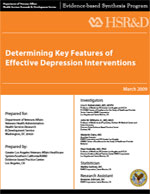
|
Investigators: Lisa V Rubenstein, MD, MSPH, John W Williams, Jr, MD, MHS, Marjorie Danz, MD,and Paul Shekelle, MD, PhD. Statistician: Marika Suttorp, MS; Research Assistant: Breanne Johnsen, BA.
VA Greater Los Angeles, CA UCLA, Los Angeles, CA HSR&D Center of Excellence for the Study of Healthcare Provider Behavior, Los Angeles, CA RAND Corporation, Santa Monica, CA Durham VA Medical Center, Durham, NC Duke University, Durham, NC Duke Evidence-Based Practice Center, Durham, NC Washington (DC): Department of Veterans Affairs; March 2009. |
Download PDF: Complete Report, Executive Summary, Report, Appendices
Current clinical guidelines for depression address depression treatment for patients detected in primary care and NICE guidelines. Research to date indicates that, under usual care conditions, less than half of primary care patients found to have major depression complete minimally adequate medications or psychotherapy. A variety of organizational changes aimed at improving care for depression in primary care have been tested. Yet evidence-based guidance for healthcare organizations and their primary care practices about which organizational changes are necessary for achieving improved depression outcomes is lacking. The purpose of this review is to establish a basis for organizational guidelines or best practices for achieving improved depression care.
The key questions addressed were: